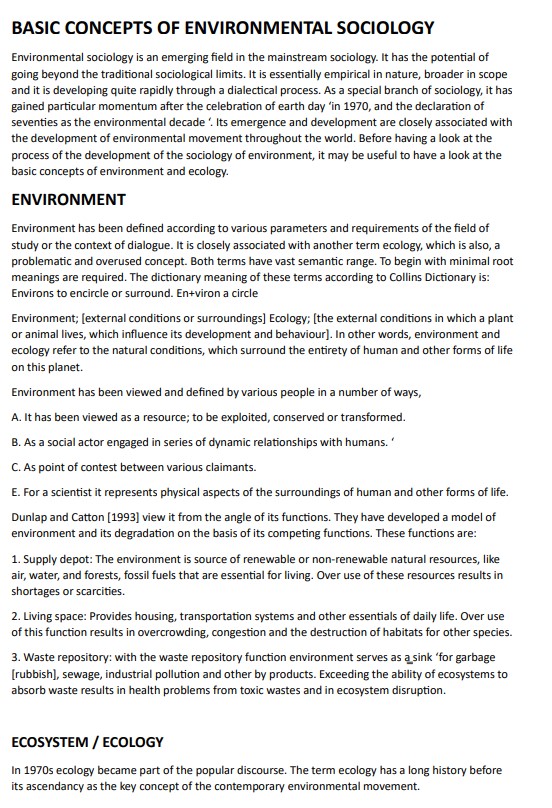Environmental Sociology Basics
Summary:
The note covers the basic concepts of environmental sociology, including the definition of environment, ecology/ecosystem, and the emergence of environmental sociology. It also discusses the main characters and areas of interest in environmental sociology, such as empirical orientation, social constructionism, environmental activism, and environmental politics. The note also mentions the phases of development of environmental sociology and the main reasons for the popularity of ecosystem ecology.
Excerpt:
Environmental Sociology Basics
BASIC CONCEPTS OF ENVIRONMENTAL SOCIOLOGY
Environmental sociology is an emerging field in mainstream sociology. It has the potential to go beyond traditional sociological limits. It is essentially empirical in nature, broader in scope, and it is developing quite rapidly through a dialectical process. As a special branch of sociology, it gained particular momentum after the celebration of earth day ‘in 1970 and the declaration of the seventies as the environmental decade ‘. Its emergence and development are closely associated with the development of environmental movements throughout the world. Before having a look at the process of the development of the sociology of environment, it may be useful to have a look at the basic concepts of environment and ecology.
ENVIRONMENT
The environment has been defined according to various parameters and requirements of the field of study or the context of dialogue. It is closely associated with another term, ecology, which is also a problematic and overused concept. Both terms have a vast semantic range. To begin with, minimal root meanings are required. The dictionary meaning of these terms, according to Collins Dictionary, is Environs to encircle or surround. En+viron a circle Environment; [external conditions or surroundings] Ecology; [the external conditions in which a plant or animal lives, which influence its development and behaviour]. In other words, environment and ecology refer to the natural conditions which surround the entirety of humans and other forms of life on this planet.
The environment has been viewed and defined by various people in a number of ways,
A. It has been viewed as a resource; to be exploited, conserved or transformed.
B. As a social actor engaged in a series of dynamic relationships with humans. ‘
C. As a point of contest between various claimants.
E. For a scientist, it represents physical aspects of the surroundings of humans and other forms of life.


Reviews